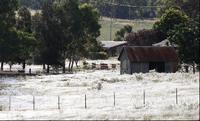-
Flood insurance program needs better approach to analyzing flood risk
In administering the National Flood Insurance Program, the Federal Emergency Management Agency (FEMA) needs a more modern approach to analyzing and managing flood risk behind levees — one that would give public officials and individual property owners a clearer idea of the risks they face and how they should address them. Because levees can reduce but not eliminate the risk of flooding, the agency should also encourage communities behind levees to use multiple methods to reduce risk and increase awareness of these risks.
-
-
The benefits of multi-state catastrophic risk pool
A modeling platform from Kinetic Analysis Corp. enabled researchers to drill deeply into large volumes of storm-related data spanning nine states and 140 years. Study finds that multi-state catastrophic risk pools offer significant benefits in major tropical events.
-
-
Natural disasters have pushed Australia’s disaster insurance sky high

As natural disasters and superstorms become more frequent in Australia, the insurance rates for people who live and work in vulnerable areas have skyrocketed to the point where people may have no choice but to go uninsured.
-
-
Insurance industry paying increasing attention to climate change-related risks

The insurance industry, the world’s largest business with $4.6 trillion in revenues, is making larger efforts to manage climate change-related risks, according to a new study; weather- and climate-related insurance losses today average $50 billion a year; these losses have more than doubled each decade since the 1980s, adjusted for inflation
-
-
Turkey’s parliament authorizes military action against Syria
Heavy Turkish artillery attacks against Syrian military targets continue for a second day, following a Wednesday’s mortar attack from inside Syria which killed five Turkish civilians; unconfirmed reports talk of a large number of Syrian military casualties; the Turkish government asked parliament for authorization to send ground units into Syria to create a buffer zone by establishing posts in strategic locations along the border, up to six miles deep inside Syria, in order to prevent similar attacks in the future; the Turkish parliament approved the request; the buffer zone, protected by the Turkish air force, will allow the anti-Assad rebels a protected areas from which to launch operations against the regime
-
-
Removing toxins from the environment

A Florida State University chemist’s work could lead to big improvements in our ability to detect and eliminate specific toxic substances in our environment; the novel approach is based on stripping electrons from the toxic chemical known as fluoride; in addition to toxin removal, the approach has many other applications
-
-
July flooding in China causes $8.3 billion of economic losses

Insurance industry faces agriculture losses from China to the United States in July 2012: flooding caused more than $8.3 billion in economic losses across China during July, while the worst drought in decades worsened across much of the United States; severe weather also prompted widespread damage in parts of the United States and Europe
-
-
Deadly Italy earthquakes result in $6 billion economic loss
Two earthquakes and subsequent aftershocks struck northern Italy within a 9-day period, killing twenty-five people, injuring more than 400 others and causing extensive damage to the cultural heritage throughout the Emilia-Romagna region of Italy, in addition to businesses and personal property; prolonged periods of rain affected China throughout the month of May, with at least 143,000 homes damaged or destroyed
-
-
ISO offers new standard for business continuity management
Incidents take many forms ranging from large scale natural disasters and acts of terror to technology-related accidents and environmental incidents; the International Organization for Standardization (ISO) has published an international standard addressing business continuity management to contribute making organizations in both public and private sectors more resilient
-
-
Insuring against Olympic cancelation
Starting on 27 July, the 2012 Olympic Games in London will see more than 10,000 athletes from nearly 200 different nations compete in 302 disciplines; nine million spectators are expected at the competition venues, while between three and four billion people will follow the spectacle on television; if the Games were called off as a result of terrorist act or another disaster, Munich Re would provide cover of around 350 million euros through several policies
-
-
U.S. severe weather insurance losses in April nearly $1 billion
A series of severe weather events across central and southern sections of the United States caused upward of $1 billion in insured losses. Economic losses were even higher during the month of April
-
-
British state-backed reinsurer has £4.5 billion to cover Olympic Games terror-related losses
Pool Re, the British state-backed reinsurer which covers commercial property losses from terror attack-related activities, has £4.5 billion ($7.327 billion) of assets to cover the Summer Olympic Games. Pool Re said it had no plans to jack up premiums for the event. If the damage from bombings or other terror-related incidents were to cost more than that amount, the British taxpayer, under the Pool Re structure, would step in to cover the difference. Pool Re was set up in the 1990s when the U.K. government was worried that the terror campaign pursued by Irish militant groups could make London property uninsurable and damage the national economy.
-
-
Industrial, materials industry facing risks on global scale
The struggling global economy and recent disasters, including the Thailand floods and Japan earthquake and tsunami, have forced the global industrial and materials industry to change the way it views and prioritizes resources for risk response
-
-
Scale of 2011 disasters challenged established thinking on nature of risk
New paper says that the scale of the catastrophes experienced in 2011 exceeded previous loss-modeling predictions and has challenged established thinking on the nature of risk; the paper says that, post-2011, companies need to re-examine their risk management strategies and introduce new methodologies to strengthen their operational and financial resilience
-
-
U.S. severe weather insurance losses breach $1.2 billion in March

The estimated economic loss of a series of natural disasters in the United States in March reached approximately $2.0 billion, while insured losses are expected to breach $1.1 billion amid more than 170,000 insurance claims
-
- All
- Regional
- Water
- Biometrics
- Borders/Immig
- Business
- Cybersecurity
- Detection
- Disasters
- Government
- Infrastructure
- International
- Public health
- Public Safety
- Communication interoperabillity
- Emergency services
- Emergency medical services
- Fire
- First response
- IEDs
- Law Enforcement
- Law Enforcement Technology
- Military technology
- Nonlethal weapons
- Nuclear weapons
- Personal protection equipment
- Police
- Notification /alert systems
- Situational awareness
- Weapons systems
- Sci-Tech
- Sector Reports
- Surveillance
- Transportation
Advertising & Marketing: advertise@newswirepubs.com
Editorial: editor@newswirepubs.com
General: info@newswirepubs.com
2010-2011 © News Wire Publications, LLC News Wire Publications, LLC
220 Old Country Road | Suite 200 | Mineola | New York | 11501
Permissions and Policies
Editorial: editor@newswirepubs.com
General: info@newswirepubs.com
2010-2011 © News Wire Publications, LLC News Wire Publications, LLC
220 Old Country Road | Suite 200 | Mineola | New York | 11501
Permissions and Policies
